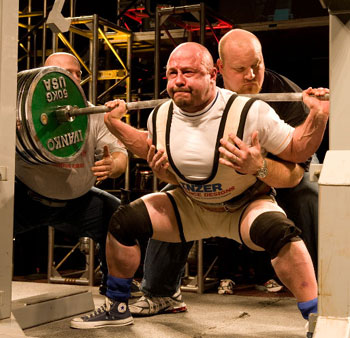If somebody were to come up to me and ask me what the three most important exercises they should learn if they were to embark on a strength program, I would answer without hesitation: Squat, Power clean and Press. In that particular order.
These three are the kings for developing a strong base and any young athlete or average Joe/Jane looking to get stronger without wasting their time should first become proficient with these movements before ever branching off to other movements or exercises. I know they can seem intimidating at first, but with a little practice and logical progression anybody can learn to do these movements safely and confidently.
So let's get to it shall we.
 Part one: The squat
Part one: The squatThe Why
The squat on of the most natural movements to human bosy can do. Anybody who has ever sat down on the floor and then stood back up has done a squat. It is ingrained into our dna. Anybody who has seen a toddler get up from sitting ans most likely seen perfect squat form. Yet the squat has been haled by many as the "King of all exercises". It is true that no other exercise produces such dramatic results in such a short time as the squat. It involves every core and stability muscle in the body as well as all the large muscles in the lower body and forces you to work hard. It also elicits a neuroendocrine response like no other movement. This means that it tells the body to release hormones which make it get stronger.
When the body is worked as a whole it's hormone systems go into over-drive. It produces more testosterone and growth hormone in an attempt to adapt to the stresses you are putting it under. This is a great thing. It means more muscle, better recovery and it makes you stronger.
The How
 |
| High bar position |
 |
| Low bar position |
| Feet at hip width |
 |
| Personally I prefer the wider stance |
NOW SQUAT!
Sit your butt back like you are going to sit on the toilet, keep every muscle you have in your body tight and bend at the knees and hips. Keep the majority of the weight on your heels and lower the bar until your upper thighs are parallel to the floor. Don't sell yourself short. Squat deep at least to parallel of even lower if you can. If you can't hit parallel, you have too much weight on the bar. You need to take some weight off and try again.
Once you hit the bottom of the squat you need to push with all your might and get that bar back up. Drive through your heels and picture your hips being the driving force to get the bar up not your shoulders.
Don't fear the squat
Squatting is a perfectly natural movement. If anybody tells you not to squat because it's bad for your knees has no idea what they're talking about. Anybody who tells you squatting below parallel is bad for your knees has no idea what they're talking about. Squatting properly has been proven to reinforce the lower body muscles alleviating a plethora of knee issues.
 We were born to squat. Take a few minutes, go to google and type in baby squat. These are only the first few results. As you can see these children are squatting with perfect form. Feet flat, weight back on their heels backs straight. I believe it was the invention of modern footwear which has caused us to loose the ankle flexibility which at one time had us all doing perfect squats as children. But that's another rant altogether
We were born to squat. Take a few minutes, go to google and type in baby squat. These are only the first few results. As you can see these children are squatting with perfect form. Feet flat, weight back on their heels backs straight. I believe it was the invention of modern footwear which has caused us to loose the ankle flexibility which at one time had us all doing perfect squats as children. But that's another rant altogetherTake care!






